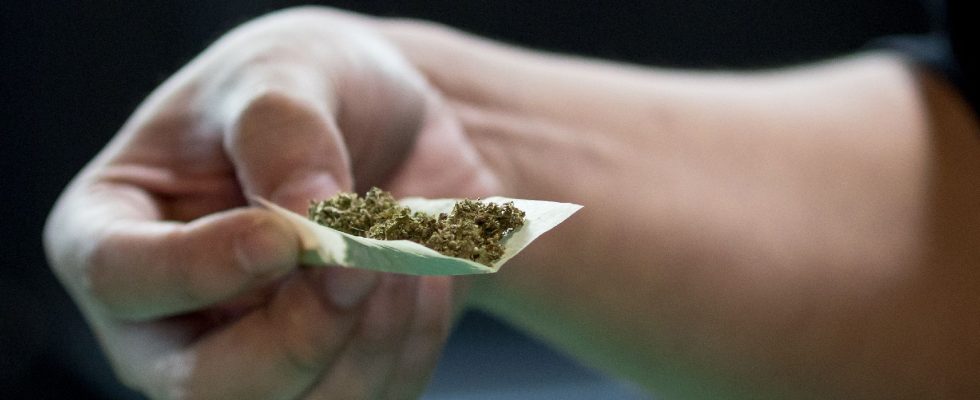In candy, herbal tea, in the form of flowers or oils… Since its authorization in France at the end of 2021, the CBD market has been flourishing. This cannabis derivative, recognized for its relaxing virtues but, unlike THC, non-psychotropic and non-addictive, is increasingly popular in France. But for nearly a year, another cannabinoid has risen to the CBD market: hexahydrocannabinol (HHC), a synthetic derivative of cannabis, is causing a stir among consumers.
Online or in stores, HHC is widely marketed with the image of a “risk-free” product, promising “intense relaxation”, “without the psychoactive effects of THC”. However, many voices have been raised in recent weeks to warn of the dangers of this substance which, according to certain addictologists contacted by L’Express, would in reality be comparable to a kind of “legal seal”. François Braun, the Minister of Health, also wants to tackle it: “we must ban this product as quickly as possible”, did he declare at the end of May. But what exactly are the risks of this substance? The Express takes stock.
A “mime” of the effects of THC
HHC, or hexahydrocannabinol, is a product that was discovered in the 1940s and then long forgotten. “It resurfaced in 2021 in the United States, in Europe a year later, and at home, in France, in the summer of 2022”, observes Joëlle Micallef, pharmacologist doctor and president of the French network of addictovigilance. In the space of a year, HHC has taken a significant place in the CBD market. According to the European Monitoring Center for Drugs and Drug Addiction (EMCDDA), it has been identified in more than 70% of EU member countries since its appearance in 2022. “The speed with which users have had forms available to them of very different presentation is without equivalence”, notes Joëlle Micallef. The product, she explains, can be consumed in the form of candies, in herbal tea or even by smoking and vaping it. “The HHC brutally flooded the market targeting very different users, down to minors with candy,” adds the doctor.
Concretely, “HHC is a synthetic substance whose chemical structure is very close to that of THC, which is the most well-known psychoactive substance in cannabis”, explains Nicolas Authier, psychiatrist and pharmacologist at the CHU of Clermont-Ferrand. “It’s a kind of imperfect synthetic copy of THC, which mimics its effects,” he continues.
Even “more powerful” than THC
In a report published at the end of April 2023, theEuropean Monitoring Center for Drugs and Drug Addiction (EMCDDA) concluded that the rise of HHC – which it describes as an “emerging” phenomenon – poses “health and social risks”. Based on pre-clinical studies (on cellular or animal models), researchers have shown that with a lower concentration, HHC would cause more effects than THC. No clinical study has yet been carried out.
Since the summer of 2022, the French pharmacovigilance network chaired by Joëlle Micallef has nevertheless been able to observe similar facts. “We have had cases of patients who have consumed this substance and the effects reported are very similar to those of THC, but when it is highly dosed”, testifies the pharmacologist. An observation shared by Nicolas Authier who, too, has been able to observe it in certain patients in recent months. “It is a psychoactive substance which inevitably has undesirable effects because it acts on the same receptors as THC, he opines. Especially since synthetic substances are often more powerful, that is to say say that you need a lower dosage to have the same effect as with a natural substance like THC. If you make a mistake in the dose, the effects are also increased tenfold, and can have more serious consequences such as seizures of panic, a psychic decompensation…”
A ban to come?
For the time being, in France, the pharmacovigilance network, whose objective is to analyze the health consequences of the consumption of legal and illegal psychoactive substances, medicinal or not, has recorded 30 cases of consumers having had effects undesirable to the point of going to the emergency room. “But in pharmacovigilance, for one case detected, we consider that there are 100 others, reports Joëlle Micallef. Not all hospitals think of sending us the information. Sometimes the link between the consumption of HHC and the degradation of the state of health is not necessarily done, and patients do not always declare what they have consumed.
According to the two doctors contacted by L’Express, HHC is sometimes added by retailers to CBD products. The objective: to “improve” the effects of the latter, supposed to be a product of well-being. “Some people have consumed HHC without knowing it, thinking they are buying a ‘more efficient’ CBD”, reports Nicolas Authier.
Faced with the scale of the HHC phenomenon, still over the counter in France but recently banned in Finland, Austria and Poland, the director general of the National Agency for the Safety of Medicines and Health Products (ANSM), Christelle Ratignier -Carbonneil, promised the publication “in the coming days” of a report “with a decision which will make it possible to frame things”. It is “a synthetic drug at risk of addiction”, she launched during an interview on franceinfo June 7.
For the Clermont psychiatrist and pharmacologist Nicolas Authier, it is certain that “HHC must comply with the same regulations as THC. We cannot prohibit one and authorize the other when they produce the same effects. It there would be an inconsistency in terms of public health.”
